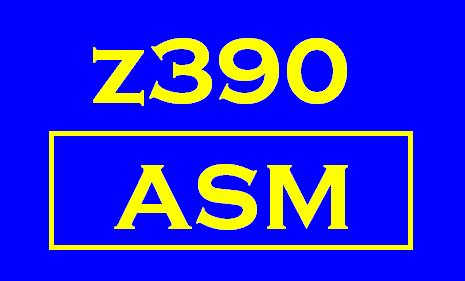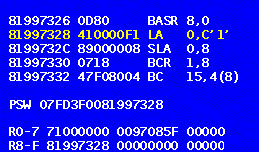| z390 Virtual Storage Access Method (VSAM) compatible
assembler support includes capability to create and access Entry Sequence
(ESDS), Relative Record (RRDS), and Key Sequence (KSDS) data set files.
Record lengths can be fixed or variable up to 2 GB. RRDS access
supports RBA (4 byte) or XRBA (8 byte) for 2**63 size files. KSDS
access supports any number of alternate keys with lengths up to 2 GB.
A REPRO utility supports loading and unloading ESDS VSAM file from/to QSAM
files. As of z390 release v1.4.01, VSAM ESDS, RRDS, and KSDS
sequential and random access are supported. ESDS, RRDS, and KSDS
sequential and random updates with insert are supported. All VSAM file types can be defined
in VCDT VSAM catalog definition tables. The VCDT catalogs can contain
any number of base cluster, alternate index, and path definitions with
default local path or explicit overrides defining user specified path and
name for data and index files. The DDNAME on ACB at open must point to
the VCDT loadable catalog table file containing the desired base cluster or
path to be opened. The DDNAME file specification can contain optional
dot suffix with the name of the base cluster or path to be opened.
If an explicit entry is not specified, the name of the ACB will be used to
find entry in the specified catalog. The current plan
for additional VSAM support is as follows:
-
KSDS alternate index read only plus
BUILDINDEX utility
-
ENQ/DEQ record locking for VSAM (currently
there is no locking)
-
KSDS ENDREQ and ERASE macro
support
-
LDS linear support with user specified
CONTROLINTERVALSIZE on DEFINE CLUSTER macro. (Note the current default
support for ESDS, RRDS/VRRDS, and KSDS does not use CI/CA structures and
all inserts are added at the end of base cluster VES data file. The
planned initial LDS support will insert dead space in CIís as required to
insure no records are split across CIís.
See the following VSAM User Guide for more information
on the current support:
- z390
VSAM User Guide (PDF)
z390 VSAM support consists of the following components:
- VCDT - VSAM Catalog Definition Table is assembled from multiple DEFINE macros
used to define VSAM base clusters, alternate index, and paths.
The VCDT is assembled and linked into loadable
table which is referened by ACB DDNAME at open time. The following
DCB physical files are dynamically allocated at ACB open time:
- VES DCB base data file with fixed or variable length
records. Variable records are prefixed with 4 byte length which
is not included in logical record length. For ESDS the
keyword INDEX=NONINDEXED is required on the DEFINE CLUSTER macro.
For RRDS the keyword INDEX=NUMBERED is required on DEFINE CLUSTER
macro. The default is KSDS which also requires keyword KEYS=(length,
offset) defining primary unique key field.
- VX0 DCB primary VRRDS or KSDS index file
containing 8 byte XRBA's to each record in VES DCB. For KSDS the
VX0 file include XRBA and primary key field in key sequence.
- VXN DCB alternate index file
for KSDS optional alternate index files
containing 8 byte RBA plus alternate key field alternate key
sequence. The VXN XRBA points to record entry in the VX0 index
file. The keyword RELATE= specifies name of base cluster, and
the keyword UPGRADE=NOGRADE can be specified to turn off updating of
alternate index.
- The DEFINE macro parameters for creating VCDT catalog are as
follows:
- CATALOG
- ,NAME= define catalog name which appears in dump
- CLUSTER,
- NAME=, base cluster name (default file names will be NAME.VES
and NAME.VX0)
- RECORDSIZE=, required fixed length or average and
maximum variable record length up to 2 GB.
- INDEX=INDEXED, optional cluster type INDEXED (KSDS default),
NUMBERED (RRDS), NONINDEXED (ESDS), or LINEAR (LDS) type VSAM cluster.
- KEYS=(64,0), KSDS primary unique key field (length,offset)
- REUSE=REUSE, optional parameter to request empty file at each
open
- VESDSN, optional user specified path and file name for base
cluster data
- VX0DSN, optional user specified override path and name for base
cluster index
- ALTERNATEINDEX,
- NAME=, alternate index name (default file name will be
NAME.VXN)
- KEYS=(64,0), alternate key length and offset in base cluster
records
- RELATE=, name of base cluster
- UPGRADE=NOUPGRADE, request no updating of alternate index
- REUSE=REUSE, optional paramter to request empty file at each
open
- PATH,
- NAME=, name of path to alternate index or alias base cluster
- ENTRY=, name of alternate index or base cluster
- UPDATE=NOUPDATE request no updating of any alternate indexes
- ACB, ACBD, CLOSE, ENDREQ, ERASE, GENCB, GET, OPEN, MODCB, POINT, PUT, RPL, RPLD, SHOWCB, TESTCB,
and VCDTD - VSAM application macros for VSAM
access/
- REPRO - utility to load or unload fixed or variable length VSAM
file from/to QSAM file. For VSAM files with variable length
records over 32760, an application program must be used to load, unload
or copy to another VSAM file.
- Demo programs in vsam\demo:
- DEMOS.BAT - assemble, link, and execute all VSAM demo programs
- ESF1DEMO.BAT - assemble, link,
and execute ESF1SP.MLC to copy fixed length QSAM file to VSAM ESDS
file and then run ESF1SG.MLC to copy ESDS file back to fixed length
QSAM file and verify QSAM files match.
- ESV1DEMO.BAT - assemble, link, and execute ESV1SP.MLC to copy
variable length QSAM file to ESDS and execute ESV1SG.MLC to copy ESDS
file back to variable length QSAM file
and verify QSAM files match.
- KSF1RPO1.BAT - load and unload KSDS fixed length file from/to text
file with 6 test names and addresses.
- KSF1DEMO.BAT - randomly read the 6 records randomly by name key
and display records.
- KSF1SKP1.BAT - point to first record with name >= "MQ" and read
and display sequentially.
- RRF1DEMO.BAT - create RRDS file with 3 fixed length records and
read records back by relative record number to verify content.
- RRV1DEMO.BAT - create RRDS file with 3 variable length records
and read records back by relative record number to verify length and
content.
- Regression test programs and files (vsam\test):
- ESF1TEST.BAT - test fixed length ESDS sequential, RBA, and XRBA
access
- ESF1SKP1.BAT - test fixed length ESDS skip sequential
forward/backward from XRBA start
- ESF2TEST.BAT - test fixed length ESDS sequential and random
update in place
- ESF3TEST.BAT - test fixed length ESDS read backwards
- ESF3GEN1.BAT - test fixed length ESDS read backwards using GENCB
for ACB and RPL
- ESV1TEST.BAT - test variable length ESDS sequential, RBA, and
XRBA random access
- ESV1SKP1.BAT - test variable length ESDS skip sequential
forward/backward from XRBA start
- ESV2TEST.BAT - test variable length ESDS with records up to
100,000 bytes
- ESV3TEST.BAT - test variable length ESDS sequential and random
update in place
- ESV4TEST.BAT - test variable length ESDS read backwards
- RRF1TEST.BAT - test fixed length RRDS random read and write
- RRV1TEST.BAT - test variable length VRRDS random read and write
and update different length
- KSF1TEST.BAT - test KSDS fixed length record query by key and
sequentail forward/backword
- KSF2TST1.BAT - test KSDS insert of 1 record and retrieval by key
- KSF2TST2.BAT - test KSDS insert of 3 records and retrieval by key
- KSF2TST3.BAT - test KSDS retrieval of existing and inserted
records by key and seq. fwd/bwd
- KSF2TST4.BAT - test KSDS
AVL
balanced tree insert support by inserting 1000 records in pseudo
random sequence and then retrieving them sequentially by key. See
AVL statistics on the STATS optional STA statistics file showing max
tree depth of 10 for 1000 records (2**10=1024).
- REPRO load and unload tests
- ESF1RPO1.BAT - test load and unload of fixed length ESDS from/to
QSAM EF format
- ESF4RPO1.BAT - load and unload ESDS fixed file from/to QSAM EF
format
- ESV1RPO1.BAT - load and unload of variable length ESDS from/to
QSAM EV format
- ESV5RPO1.BAT - load and unload ESDS variable file from/to QSAM EV format
- RRF1RPO1.BAT - load and unload RRDS fixed file from/to QSAM RF
format
- RRF2RPO1.BAT - load and unload RRDS fixed file from/to QSAM RF
format
- RRV1RPO1.BAT - load and unload RRDS variable file from/to QSAM RV
format
- ESF1RPQ1.BAT - test load and unload of fixed length ESDS from/to
QSAM E format
- ESF4RPQ1.BAT - load and unload ESDS fixed file from/to QSAM FT
format
- ESV1RPQ1.BAT - load and unload of variable length ESDS from/to
QSAM V format
- ESV5RPQ1.BAT - load and unload ESDS variable file from/to QSAM VT format
- RRF2RPQ1.BAT - load and unload RRDS fixed file from/to QSAM F
format
- RRV1RPQ1.BAT - load and unload RRDS variable file from/to QSAM V
format
- See online
document with VSAM regression tests by RPL option and macro type
IBM VSAM Related References:
- VSAM
Demystified (Redbook)
- VSAM
Data Set Overview and Design Parameters
- z/OS
DFSMS AMS for Catalogs
- DEFINE
CLUSTER to define base cluster
-
DEFINE ALTERNATEINDEX to define an alternate index
-
DEFINE PATH to define path for accessing base via an alternate index
- z/OS
DFSMS Macro Instructions for Data Sets
- ACB
macro to access VSAM cluster
-
OPEN - open one or more ACB's
-
CLOSE - close one or more ACB's
-
GENCB - dynamically generate ACB
-
GENCB - dynamically generate exit list
-
GENCB - dynamically generated RPL
-
MODCB - modify ACB
-
MODCB - modify exit list
-
MODCB - modify RPL
- RPL
macro to request specific VSAM record access
-
ENDREQ - end request to release update locking
-
ERASE - delete record previously retrieved via GET
- GET
macro to read record
-
POINT - set current position to specified key, record, or RBA
address
- PUT
macro to write record
-
SHOWCB - show contents of ACB
-
SHOWCB - show contents of exit list
-
SHOWCB - show contents of RPL
-
TESTCB - test content of ACB field
-
TESTCB - test content of exit list field
-
TESTCB - test content of RPL field
-
VSAM macro return and reason codes
- z/OS
DFSMS Using Data Sets
-
Loading a VSAM Data Set
-
RDF record definition fields at end of control interval (not used)
Other Useful VSAM References:
|



